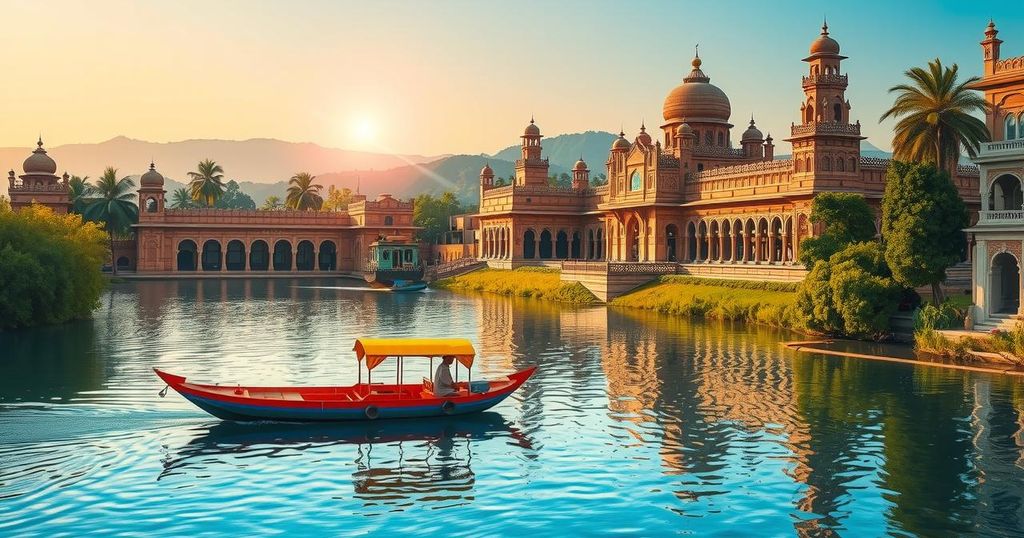Politics
AMAR NAGARAM, ASIA, CAMBODIA, CHALET HOTELS LIMITED, CHINA, DIGITAL ECONOMY, DIGITAL TRANSFORMATION, ECONOMIC GROWTH, HUSSAIN PATEL, INDIA, INNOVATION, MEXICO, NA, NAVNEET NAGPAL, NORTH AMERICA, SANJAY SETHI, SPECTRA HOSPITALITY SERVICES, SUPPLY CHAIN, THAILAND, TRIPJACK, TTW, UNION BUDGET, VIETNAM, VIRGIO
Sophia Klein
India’s Union Budget 2025-26: A Strategic Move to Enhance Global Tourism
The 2025-26 Union Budget positions India as a key player in the global tourism sector, focusing on infrastructure enhancement and financial incentives. Industry leaders express optimism regarding measures aimed at improving efficiency, connectivity, and collaboration. Tax exemptions and support for startups are also highlighted as crucial for growth. The budget establishes a foundation for sustainable tourism development, ensuring a robust future for the industry.
The Union Budget for 2025-26 has positioned India’s travel and tourism sector as a crucial component of the country’s economic strategy. With a commitment to enhancing infrastructure and offering financial incentives, the Indian government aims to transform the tourism landscape, allowing it to compete effectively with global counterparts including China, Australia, and Southeast Asian nations.
Industry executives expressed optimism regarding the budget measures. Hussain Patel, Director of TripJack, highlighted the importance of improving industry efficiency through adjustments in GST and compliance processes, which he believes will foster growth in domestic and inbound tourism.
Amar Nagaram, Founder and CEO of Virgio, emphasized the need for affordable logistics and better digital infrastructure to enable start-ups to thrive. He advocated for collaborations between MSMEs and larger firms to catalyze economic growth, reflecting the budget’s focus on tax benefits and simplifying regulatory frameworks.
Dr. Sanjay Sethi, Managing Director of Chalet Hotels Limited, called the budget a game-changer due to its emphasis on connectivity, including visa reforms and the expansion of the UDAN scheme, which would enhance ease of travel. Navneet Nagpal, Director at Spectra Hospitality Services, affirmed the potential of this scheme to unlock tourism prospects.
Tax exemptions were welcomed by Anand Vardarajan of Tata Asset Management, who noted an increase in the exemption limit, which could lead to increased discretionary spending on travel. Rajesh Ghanshani of STAAH also recognized the importance of granting infrastructure status to hotels, envisioning significant industry growth.
Shikhar Aggarwal, JMD of BLS International, regarded the development of iconic tourist sites as vital for boosting India’s global tourism appeal. Lucas Ramos of RCI praised the government’s focus on medical tourism, which positions India as a leader in travel and healthcare.
Religious tourism is anticipated to expand, with Aditya Sanghi of Hotelogix highlighting developments linked to Buddhism. Dharamveer Singh Chouhan, CEO of Zostel, noted improved access to regions rich in hidden gems. Jatinder Paul Singh, CEO of Viacation, remarked on the budget’s promising approach towards adventure tourism.
Finally, Arun Bagaria of TravClan noted the plans to develop tourist destinations and enhance e-visa facilities as essential steps toward cultivating a vibrant tourism ecosystem. The Union Budget sets a robust foundation for India’s tourism sector, indicating a collaborative future between public and private entities to bolster growth.
India has emerged as a significant player in the global tourism industry, competing with established destinations like China, Australia, and Southeast Asian nations. The government’s commitment to enhancing infrastructure and providing financial incentives is essential for attracting both domestic and international travelers. The 2025-26 Union Budget reflects these goals, aiming to position India as a global tourism destination while ensuring sustainable growth in the sector.
The Union Budget for 2025-26 offers a comprehensive roadmap for revitalizing India’s tourism sector through strategic investments, regulatory reforms, and a strong focus on connectivity and inclusivity. By fostering collaboration between the government and industry stakeholders, India aims to enhance its attractiveness as a premier global travel destination and facilitate significant economic growth in this vital sector.
Original Source: www.travelandtourworld.com








Post Comment